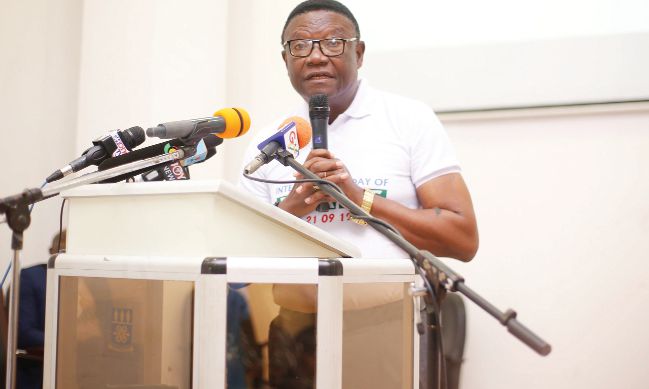
Safeguard country’s peace - Peace Council
The National Peace Council (NPC) has called on Ghanaians to buckle up in protecting the country’s peace in the face of increasing threats to undermine it.
It said a conflict-mapping exercise carried out by the National Peace Council in collaboration with the University of Cape Coast, showed that every region in the country had a lingering conflict.
“The need for peace in this country has never been more apparent than this present time when our elections are more fiercely contested, our youth becoming increasingly agitated over limited opportunities, political vigilantism, recent kidnappings and murders of prominent persons with impunity eating into the very fabric of our society,” the Chairman of the Council, Rt Rev. Prof. Emmanuel Asante, said.
Speaking at an event in Accra to mark the International Day of Peace, Rt Rev. Prof. Asante said apart from the internal challenges, the threat of violent extremism loomed large over the sub-region.
Murders and kidnappings
The Peace Council Chairman’s remarks come on the back of at least three kidnapping cases this year involving Indian, Estonian and Canadian nationals and the murder of some prominent chiefs in Kumasi in the Ashanti Region; Osenase near Akwatia in the Eastern Region and Akramang in the Central Region, as well as Prampram in the Greater Accra Region.
Advertisement
“These conflicts do not only threaten the peace of our country but also the socio-economic development as peace and development have widely been shown to be directly affected,” he said at the event which is celebrated on September 21 very year to commemorate and strengthen the ideals of peace both within and among all nations and peoples.
Organised jointly by the Peace Council and UNDP, the event was on the theme: “Peace Our Greatest Resource.”
World Day of Peace
The International Day of Peace, also known as World Peace Day, is marked on September 21 each year.
The United Nations General Assembly declared in a resolution sponsored by the United Kingdom and Costa Rica that the day be devoted to commemorating and strengthening the ideals of peace
The date initially chosen was the regular opening day of the annual sessions of the UN General Assembly, the third Tuesday of September. However, this was changed in 2001 to the current annual celebration on September 21.
The first event was commemorated on Tuesday, September 21,1982.
Most peaceful
In June this year, Global Peace Index ranked Ghana as the fourth most peaceful country in Africa and the first in West Africa. Mauritius, Botswana and Malawi ranked first, second and third respectively as the most peaceful countries in Africa.
That notwithstanding, Prof. Asante said the country had had its fair share of events that threatened its peace and, therefore, rallied Ghanaians to pay due diligence to nip conflict situations in the bud.
“Our beloved country has come a long way in the struggle for sustainable peace and we should join hands to put up a good fight to achieve the sustained peace wherever we find ourselves,” he said.
Over the years, the NPC has played pivotal roles in maintaining the country’s peace from its national, regional to district councils, making timely interventions to tame conflicts, including electoral ones that would have escalated.
Stand with us
With the country boasting of a robust peace architecture that has earned praise from the international community, the Rt Rev. Prof. Asante appealed to the government and the international community to continue to stand by the council as “it is only in an environment of peace that Ghana can continue to consolidate the economic gains it has chalked up in recent years and improve the lives of the people.”
Double-track courts
With the public said to be losing confidence in the judicial system because of excessive delays in the adjudication cases, the Speaker of Parliament, Prof. Aaron Mike Oquaye, suggested the introduction of the double-track system in the work of the courts to speed up the adjudication of cases.
He said the current system which prolonged adjudication was breeding criminality as confidence waned in the judicial system.
He called for a collaboration among Parliament, the Peace Council and the UNDP to work on a proposed legislation to curb doom prophecies which threatened the country’s peace.
“We don’t want to rise one day to see that because of a prophetic statement, our country is in flames,” he said, adding that conflict prevention was a better option rather than resolution.
He said the statements of doom traded on people’s emotions, and sentiments needed to be tackled before they degenerated into something dangerous.
Commitments
In a speech read on his behalf by his deputy, Mr Henry Quartey, the Minister of the Interior, Mr Ambrose Dery, expressed the government’s commitment to maintaining the prevailing peace.
Mr Dery said the successful instalment of Yaa Naa Abubakari Mahama II after 22 years of a protracted conflict attested to the government’s drive and commitment to peace.
UNDP Resident Representative, Ms Silke Hollander, observed that the peace Ghana enjoyed compared to its neighbours could not be taken for granted and required diligence and sustained efforts maintain it.
“Beyond the effective peace architecture, it is Ghana’s democratic traditions, systems and institutions for justice, conflict resolution that are assets to social and economic development, and merit constant care and strengthening, to keep at bay new risks and threats.
With 27 years of constitutional rule under its belt since 1992, the UN Resident Coordinator, Ms Sylvia Lopez-Ekra, praised Ghana’s democratic credentials, saying that “it is the beacon of democracy and peace within our troubled sub-region.”
